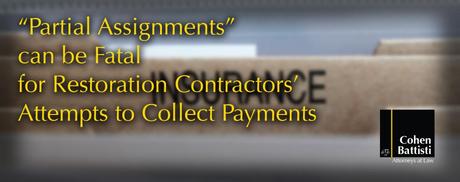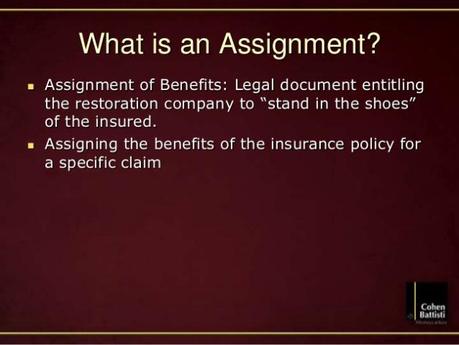
Homeowners and restoration contractors who attempt to enter into a partial assignment of insurance benefits should know that partial assignments for the contractor’s services have repeatedly been found to be invalid contracts in Florida courts. An invalid assignment contract typically results in the homeowner remaining 100% responsible for paying the contractor for the services performed on the home. This is because the insurance company is not required to honor true partial assignments and courts will not enforce an invalid contract.
Sometimes insurance companies will say that a valid, complete assignment is just a “partial assignment” because the insurance company thinks both the policyholder and the contractor are trying to collect payment for the services the contractor performed. However, this is not what either the policyholder or the contractor intended in the assignment of benefits. Once the policyholder assigns the rights and benefits to the contractor to allow direct billing and collect payment for the services the contractor performed, the policyholder no longer has any rights or interest in collecting payment for services performed by that contractor. The policyholder transferred those rights and interests to the contractor, so only the contractor is entitled to collect insurance payment for their invoice.
The assignment of benefits should state that the policyholder assigns and transfers “any and all insurance rights, benefits and proceeds under any applicable insurance policy” to the restoration contractor. It should be clear that the policyholder has made a complete assignment of benefits to the contractor and not a partial assignment. This is because Florida courts have held that only one entity “owns” the cause of action against an insurer at any one time and the one that owns the claim must bring the action if an action is to be brought. The reasoning is that in the case of a partial assignment, if both the policyholder and the contractor own the rights to collect payment for the contractor’s services, the insurance company is subject to multiple suits or claims for the same amount due.

Slide from Cohen Battisti’s “Insider Secrets” Slideshow
In a typical property damage insurance claim where a policyholder hires a contractor, the policyholder may assign and transfer the rights and benefits to collect payment for its services to the contractor in exchange for the contractor not requiring immediate payment from the policyholder at the time services are provided. The policyholder still remains responsible for amounts owed that the insurance company does not pay in benefits. Once the assignment takes place, the contractor owns the claim only for the value of the services they performed, and has the policyholder’s permission to directly bill the insurance company for payment of these services.
If an insurance company does not issue full payment to the contractor for its services performed after receiving a proper assignment of benefits and the contractor’s invoice, and after certain conditions are met, the contractor can proceed to collect payment directly from the insurance carrier, and if that fails, then to file suit against the insurance company.
The bottom line is that with a complete assignment of insurance benefits given to a contractor for collecting payment for services they performed, the contractor is the only owner of the claim for their services rendered. It is important to avoid partial assignments because it may not be found valid and may not be enforced in a court of law. Moreover, with a complete assignment given to a contractor for services rendered, the policyholder still, always maintains the rights to collect benefits for any damages they have which are not related to the contractor’s services performed. The list is long but can for example include payments for additional or supplemental property damage that needs repairs in the same claim, or for additional living expenses.
If you have any questions about an Assignment of Benefits or partial assignments, consult a licensed Florida attorney. At Cohen Battisti, we handle these assignment issues every day regarding insurance disputes and want to help you get paid.

